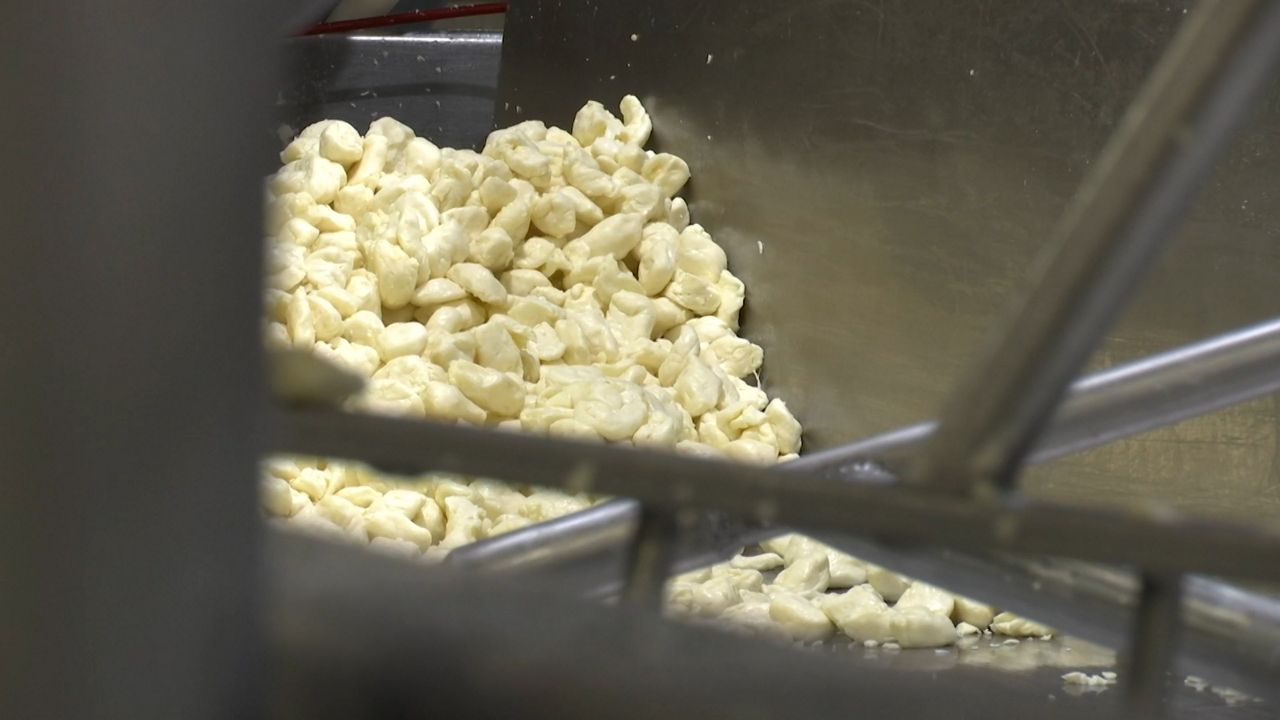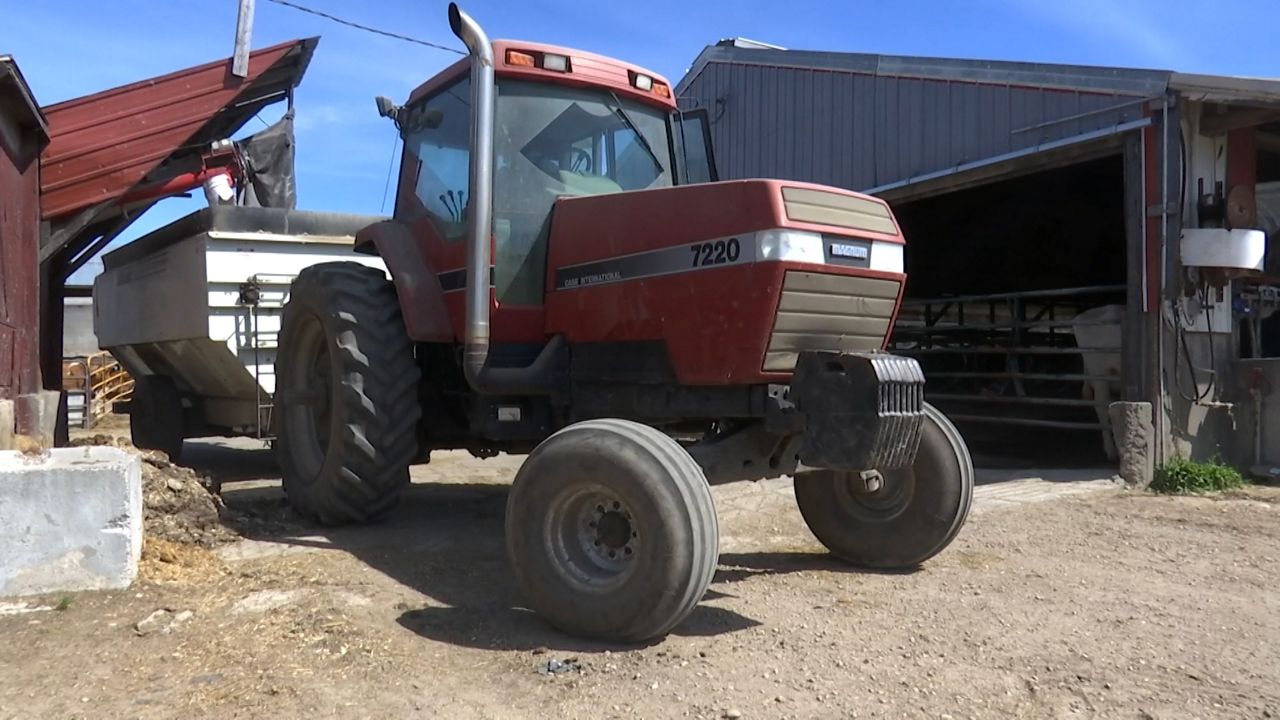MADISON, WI (SPECTRUM NEWS) — Tim Haen and his brothers have owned Haen's meats for more than two decades. Like most businesses, the Kaukuana-based meat packer and store has never operated under new conditions thrust on the world by the coronavirus pandemic.
“It's just been evolving it seems like every Monday you're starting a new learning lesson on how to adjust with your employees, adjust with your customers and try to keep everybody with a positive attitude,” Haen said.
Up and down the meat and livestock industry coronavirus is taking its toll.
At the heart of the issues are the larger meat packing and processing plats, one's much larger than Haen's and its couple-dozen employees. Instead the plants that employ hundreds — or thousands — of people are faced with a tough task: keep meat moving in the supply chain while keeping an incredibly contagious virus out of the workforce.
“It just takes a lot of people and unfortunately many of those are working close to each other,” said Jeff Sindelar, a University of Wisconsin - Extension meat specialist.
Coronavirus in the factory
The United Food and Commercial Workers (UFCW) International Union says that 6,500 meatpacking and food processing employees have been impacted by the coronavirus — meaning they either have tested positive for it, are awaiting a test, or have missed time from work to quarantine because of close contact to someone who had it. The UFCW said 13 have died from the coronavirus.
UCFW said it has identified 13 plants that have closed at least temporarily in the past couple of months. The Union said that 24,500 workers are impacted by those closures.
In Wisconsin there have been cases at several plants. On Thursday Brown County health officials announced they had linked 267 coronavirus to meat processing plants — 189 linked to JBS; 55 to American Foods Group; 23 to Salm Partners meat processing plants.
The outbreak in Brown County this week catapulted it to the second largest outbreak of any county in Wisconsin other than Milwaukee County.
In a written statement, JBS said it’s taking steps to mitigate the spread of the virus including taking employees temperatures when they enter the plant, staggered shifts and enhanced cleaning procedures. JBS said also taking measures to keep workers a safe distance from either in areas like the cafeteria and locker rooms.
“The coronavirus pandemic has affected all of us, and we salute our team members who are working hard each day to continue to feed the country,” the company said in the statement.
The Smithfield Foods announced it will temporarily close a meat processing plant in Cudahy, Wisconsin after a “small number” of employees that tested positive at the facility. The company declined to disclose how many employees. 1,200 people work at the Cudahy plant, the company said it would close for two weeks.
The closures and outbreaks rattle the industry, but meat trade groups insist it won't take down the supply chain.
The Wisconsin Beef Council released a statement saying there is no shortage of beef.
“Wisconsin is home to several beef processing plants,” said Val Gaffney, Wisconsin Beef Council President in a statement. “As the beef industry copes with the spread of COVID-19, plants are slowing processing speeds to allow for the distancing of workers and the use of additional protective equipment to keep employees healthy.”
On a national scale, the UFCW is advocating for the safety of the meat supply workers. The Union sent a letter to Vice President Mike Pence asking the White House Task Force take several steps to ensure the safety of people in the plant.
In a statement the UFCW said it “Urgently called for the White House Coronavirus Task Force to prioritize five safety actions targeted toward the meatpacking industry, including: (1) increased worker testing, (2) priority access to PPE, (3) halting line speed waivers, (4) mandating social distancing, and (5) isolating workers with symptoms or testing positive for COVID-19.”
Temporary closures and plant slowdowns leave impacts at both the beginning and end of the supply chains — for livestock producers and meat consumers.
“That has a trickle down effect,” said Brenda Boetel, a professor of agriculture economics with the University of Wisconsin.
Impact on livestock producers
Meat packing and processing plants around the Midwest and the U.S. have slowed down or closed along with Wisconsin ones. UCFW estimates that has lead to a 25 percent reduction in pork slaughter capacity and a 10 percent reduction in beef slaughter capacity.
The U.S. Department of Agriculture reports that estimated number of pigs slaughtered this week up until Thursday was about 17 percent lower than this period last year. For cattle the amount slaughtered this week so far was about 29 percent lower.
The numbers have been falling quickly. The USDA estimates the amount of pigs slaughtered on Thursday was about 14 percent lower than last Thursday, about 9 percent lower for cattle.
Livestock producers were prepared to fill normal quantities of animal orders before the coronavirus hit, now it's leaving many hanging.
“In some cases they have hogs or cattle contracted to a plant that is closed. They don't have anywhere to go with them, and that's a drag on the market,” said Jeff Swenson, livestock and meat specialist with the Wisconsin Department of Agriculture, Trade and Consumer Protection.
The situation has lead to an oversupply of meat on the market. Hog prices are falling, late last week they were about half of what they were in mid-February before rebounding some this week. Cattle prices have fallen too, about 30 percent since mid-February.
“Overall it's going to have some big financial impacts for these producers,” Boetel said.
The impact isn't just on lower prices for the animals. Boetel said many local animal sale barns have closed for week to two week spans, or have reduced availability and can't facilitate as many animal sales in a day.
The inability to move the same volume of livestock puts farmers and ranchers in the position to hold on to animals for longer than they expected.
“Which creates issues again,” Boetel said “You had to feed that [animal] that whole time so that's a cost then to you that you had to incur.”
Swenson said many farmers don't know when their next paycheck is coming. He says for many, the timeline is urgent for things to return to normal.
“Things need to turn around immediately in order to fix this problem,” Swenson said.
Lower prices to farmers and ranchers doesn't translate to lower prices in the grocery stores though, in fact the coronavirus could have the opposite effect.
“So we've got less meat coming out and then that will increase the box beef price, or the cutout price,” Swenson said. “The wholesale price and retail price and might even increase the price to the consumer in the grocery store.”
Consumers, coronavirus, and meat
Haen's Meats is much more busy these days. In large part, it's thanks to people buying more in its shop.
“It's gone up probably 30 percent on normal buying habits,” said Tim Haen, a part owner of the business.
Haen said a family that used to buy maybe 10 pounds of ground beef now will frequently order 20 to 30 pounds.
The business has shortened the amount of time they can hold on to orders, asking people to pick up meat quicker after ordering. Haen said he notices jumps in orders periodically after a news report sparks people's urge to buy.
“Everybody just panics again and starts busting in the doors again and hitting our inventory which is making us all work a little bit longer,” Haen said.
It reflects a change nearly every food sector is dealing with, consumer buying habits have drastically shifted after restaurant access dwindled with coronavirus precautions.
“From a consumer standpoint we're seeing larger purchases of meat further apart from each other,” Swenson said.
The meat industry in the U.S. Is an efficient system, designed to meet orders on the day and time of day they are needed.
Boetel referred to it as a 'just in time marketing system' set up to meet limited cold storage systems at stores, but not exceed it. Now the system is being asked to pivot by consumer habits.
“It's not that easily changed,” Boetel said.
Boetel said it's not just things like restaurants, but large events like concerts or sports being cancelled also leave a mark.
She uses hamburger meat as an example. The meat sold to a grocery store and to a restaurant or stadium aren't exactly the same. Grocery stores sell packs in one or two pound containers. Sales to the food service industry happen in much larger quantities.
“It's not as if there isn't that product necessarily it's just that it's not packaged necessarily for that particular venue,” Boetel said.
That gets at the very reason meat is as affordable as it is in the country according to
“The reason that prices are as cheap as they have been up to this point is because we have a very efficient system,” said Jeff Sindelar, a University of Wisconsin - Extension meat specialist.
So the reduced efficiency can raise prices. It may also impact what you see at the store. Certain products may not be available for short periods of time if the right processing or packing plant is closed. The slowed production could make certain lean percentages of ground beef products unavailable for stints too.
All of that doesn't mean meat will suddenly become unavailable.
“Shelves are going to be stocked, I mean we have meat in the pipeline all the way back to the farm and we'll get through this as far as figuring out the processing standpoint,” Swenson said.
The situation has made things busier for smaller processors or butchers.
“What I've heard is they've seen an uptick in business, they're just busier than busy,” Sindelar said.
That's what Haen is seeing too. Not just from customers, but from farmers looking for a place to sell their livestock.
“They want to get more in, but we don't have the capability to take more in, because we don't have the capability to take more in because we can only produce so much per week with our team,” Haen said.
It's created a stressful situation for food service workers, Haen said.
“We're doing the best we can every day, if you can just, when you come into a place maybe thank them. The people, I know the people are struggling,” Haen said.
The supply chain
There is no doubt coronavirus is placing strain on the meat supply chain. However, so far the pattern for many plants has been a slowdown or two week closure to get ahead of the virus.
“Now that two weeks can have a big impact, but it's not to say that we're not going to have enough beef and pork,” Boetel said.
Experts say an increase in prices that may hit stores at some point wouldn't last long either.
“That's absolutely a temporary thing, just responding to the conditions,” Sindelar said.
The lower prices to farmers may stick around longer. Swenson said there is hope that international trade could pick back up and help. He also said consumers can help the farmers out.
“Making sure that meat is on your grocery store list certainly will help the farmers right now to move this product through the pipeline,” Swenson said.
Up and down the supply chain people are still working to get food into the hands of consumers. Farms, processors and stores are all essential businesses. Something the Wisconsin Beef Council is telling people too.
“Wisconsin farmers continue to care for their cattle on a daily basis, and we want to ensure there is beef on the shelves in grocery stores across the state,” Gaffney said.










